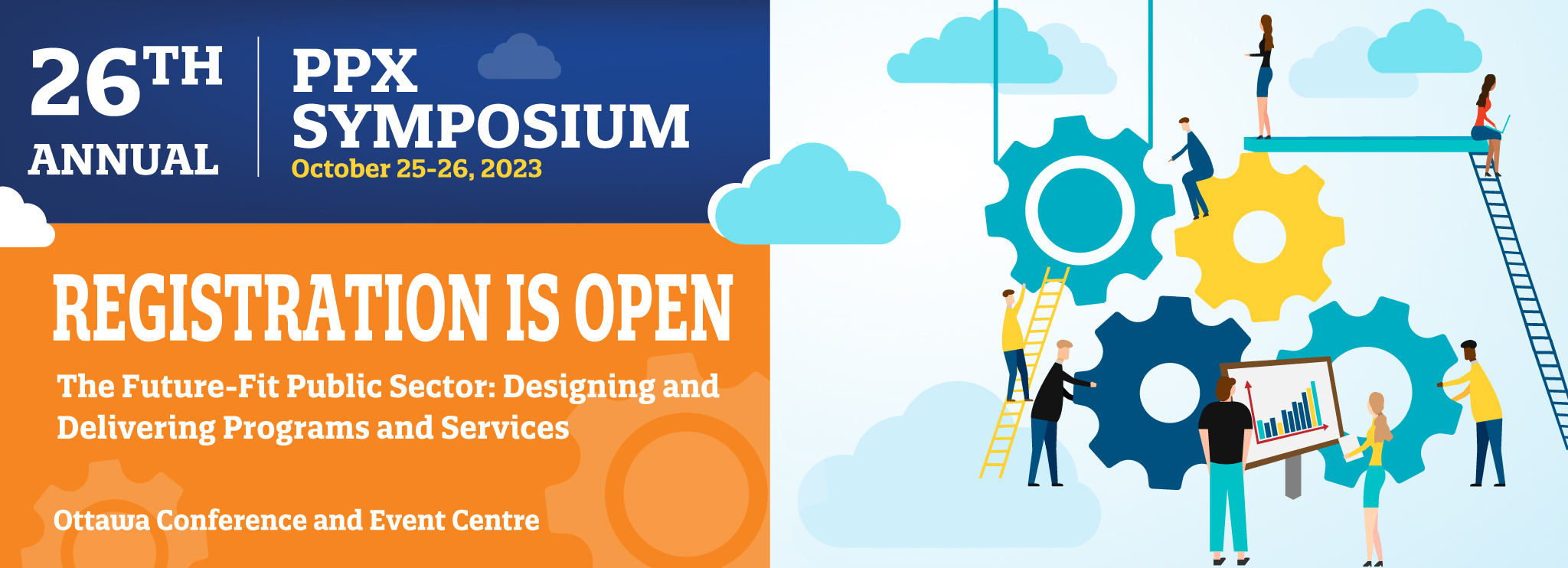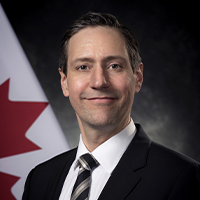
The Future-Fit Public Sector:
Designing and Delivering Programs and Services.
Ottawa Conference and Event Centre
200 Coventry Rd, Ottawa, ON K1K 4S3
As the public sector emerges from the pandemic, many issues confront professional public servants across jurisdictions and challenge the whole public sector.
Planning, performance measurement, monitoring, evaluation and reporting functions are not ends in themselves – they are central for improving policies, programs and service delivery. Integration of performance measurement systems into the public and private sector remains a goal to be realized.
The Symposium theme will be:
- “What We Are Doing?” High-level issues, including: the environment and sustainable development; the role of public audit; truth and reconciliation with Indigenous peoples; and digital transformation.
- “Why Do We Need to Change?” The drivers and conditions for renewal including: The Strategic Policy (Spending) Review; the role of an evaluator general; the Review of the 2016 Treasury Board Policy on Results; and Capacity Gaps.
- “How Will We Know We’re Getting There?” The use of results-based management in planning, performance measurement, audit, evaluation and reporting — and related areas such as risk management.
Subject to Change
Agenda
| 8:45 AM – 8:50 AM |
Indigenous Recognition |
| 8:50 AM – 9:00 AM |
Welcome & IntroductionsArt Stewart, PPX President & Tom Wileman, Chair, Symposium Committee |
| 9:00 AM – 10:00 AM |
Opening Keynote
|
| 10:00 AM – 10:30 AM |
Networking Break |
| 10:30 AM – 11:30 AM |
Plenary Panel – in room 106HFuture Strategies for Public Audit This panel will be offered in French from 10:30-11:30 and repeated in English from 11:30-12:30
Description: This panel examines the development of strategies for legislative and internal public audit in Canada. Paul Forgues, President of the Canadian Audit and Accountability Foundation will speak about the mandate of the Foundation and its impact on strategic thinking in member audit organizations. Professor Luc Juillet, from the University of Ottawa will present research findings regarding strategic thinking in both forms of public audit. Moderator: Panelists: |
| 10:30 AM – 11:30 AM |
Concurrent 1Click here for PresentationDigitalizing Results Management
Recent research suggests that public managers do not consistently use performance information, and when they do, the data has negligible impact on organizational results. Although scholarly and practitioner debate on the topic of government performance has generated an understanding of the key components of performance measurement systems and of the performance management cycle (van de Walle and van Dooren, 2010), several critical questions emerge, about how managers use performance information (Kroll, 2015a; 2015b; Moynihan and Pandey, 2010; Walker et al., 2018) and the impact of managerial agency (Boyne, 2004; Boyne et al., 2005). Researchers argue that more sophisticated performance information that includes advanced analytics might encourage managers to use performance information more extensively (Ballard, 2020; Kroll, 2015b; 2015a). In addition, organizations could improve the relevance of data by connecting analytics to the organization’s input-to-outcome transformation process (Vogel and Hattke, 2018). This presentation will outline the results of case studies that explored the use of logic models as a touchstone for linking performance information to organizational objectives. The logic model served as a guide to capturing the right data and to creating an analytics strategy. Nevertheless, the case studies (that included private, public, and not-for-profit organizations) reveal common problems: insufficient data, data in the wrong format, and the need for an analytics strategy connected to the organization’s overall objectives. |
| 10:30 AM – 11:30 AM |
Concurrent 2Click here for PresentationPath to Performance Measurement Improvement at Employment and Social John Mitchell, Senior Policy Analyst, Employment and Social Development Canada (ESDC) A presentation detailing how ESDC’s Performance Measurement Division has been investigating the use and utility of performance information in the department. John will look to support the “How will we know we are getting there?” theme by outlining some of the organization’s experiences and findings from research conducted over the last year. In addition, he will provide an overview of the division’s plans to raise the department’s maturity-level with performance measurement and capacity for results-based management over the coming years. |
| 11:30 AM – 12:30 PM |
Concurrent 3Click here for PresentationThe Government of Yukon Performance Measurement & Evaluation Framework: Centering Integration and Concision in Performance System Design Stephanie Hawkins, Director Evaluation, Government of Yukon. Implementation of the Government of Yukon’s new Performance Measurement & Evaluation Framework (the Framework) came into effect on January 1, 2023. The Framework applies to Yukon government programs, policies, and strategies; its scope encompasses evaluation, performance measurement, and the integration of budget, strategy, and results. The Framework is, in many regards, reflective of similar policies such as the Government of Canada’s Policy on Results. The design and implementation of the Performance Measurement & Evaluation Framework, however, makes notable departures from convention in two distinct realms:
|
| 11:30 AM – 12:30 PM |
Concurrent 4Click here for Presentation(NOTE: THIS SESSION WILL BE PRESENTED IN FRENCH) Developing a Framework for Measuring and Monitoring the Performance of Public-Private Partnerships (P3s) in Infrastructure Projects in Canada Cheick Alassane Traore, University of Ottawa The purpose of this study is to highlight the elements in the literature to report on the performance of P3s and to develop a systematic framework for measuring and monitoring this performance from a public sector perspective and the project life cycle. This framework must be operational and accessible to professionals to evaluate the performance of P3s at different stages of the project life cycle and to overcome the ideological debates surrounding P3s. This study makes it possible to establish an original performance measurement framework that combines different aspects of performance and the complete life cycle of P3s. It surpasses the current analysis of the performance of P3s, which is limited to construction, costs and infrastructure quality, and explores issues of governance, competition, sustainability of public funding, etc. Using information from nearly 200 P3s projects in Canada, this study allows for the analysis of a wide range of P3s. It fills a knowledge gap on the performance of P3s and enriches the literature on performance. |
| 11:30 AM – 12:30 PM |
Concurrent 5Click here for PresentationThe Current State of GBA+ Analysis in Federal Government Evaluation: How Close Are We to Support the Result-based Management Practice With a GBA+ Lens? Deen Taposh, Manager Strategic Policy, Employment and Social Development Canada The use of GBA+ analysis in federal government evaluations has increased over the years (Gauthier et al., 2022). The disproportionate impact of the pandemic has also reinstated the importance of GBA+ analysis in the public sector (Cameron and Lindsay, 2023). The question, however, remains to what extent federal government evaluations are using GBA+ analysis. Learning from an environmental scan of a representative sample of recently published and publicly available federal government evaluation reports, the presentation proposes to examine the following questions:
The findings from the environmental scan will be in an aggregate form without stating the underlying causes. Given the content may explore published findings from several federal departments, the views should be solely attributed to the authors. |
| 12:30 PM – 1:30 PM |
LunchSponsored by Carleton University Public Policy and Program Evaluation |
| 1:30 PM – 3:30 PM |
Plenary PanelStrategic Policy (Spending) Review
Professor Evert Lindquist, University of Victoria Don Wilson, Executive Director, Treasury Board of Canada Secretariat |
| 2:30 PM – 3:30 PM |
Case Study PresentationsGita Zareikar, Carleton University What do spending and strategic reviews mean for departments, ministries and agencies? Are the days of free flowing money over? What does it mean to be going into austerity? The pandemic placed many countries, including Canada, into major debt and deficit positions with net debt to GDP levels rising well above 75 percent. In Canada’s case, this figure is closer to 48 percent, which is still significant, with few signs that debt levels will return to pre-pandemic levels anytime soon. The federal government announced that it will be looking to departments and agencies to find $15B in savings over the next five years, which seems insignificant, but is this the real story? It seems fairly certain that budget increases will not be forthcoming, hiring will slow down dramatically, and there will be less reliance placed on outside consultants to support program delivery. This session will divide the time into two main parts. The first will feature a panel of senior public servants, who will discuss the state of readiness in their departments for austerity measures, systems and capability gaps they are observing, and advice on ways to address these gaps in a constructive way. The second will feature some research undertaken that compares the Canadian experience with spending and strategic reviews with other countries that are performing well post-pandemic, including The Netherlands, Ireland, Nordic countries and Japan. The aim is to highlight that there are several models for implementing reviews and how these contribute to not only expenditure management but to facilitating a broader policy agenda of public service reform. |
| 3:30 PM – 4:30 PM |
Concurrent 6Click here for PresentationWho Am I to Evaluate That? How We Aspired to Apply the Values of Diversity and Inclusion in Our Evaluation. Mary Peters, Senior Evaluator, Treasury Board of Canada Secretariat How do you know if your best was good enough? Considering two Treasury Board of Canada Secretariat evaluations, this presentation will discuss our approach and the learning curves inherent in inclusive, diverse, equitable and accessible evaluations. We are all more than we appear – how can we bring this to table? |
| 3:30 PM – 4:30 PM |
Concurrent 7Click here for PresentationRelevance Reconsidered: Exploring Evaluation Criteria for Public Programs and a Forward-Looking Approach in Canada’s Ministry of Natural Resources (NOTE: THIS SESSION WILL BE PRESENTED IN FRENCH) Raoul Tamekou Tsowa, Ph.D, Policy Analyst, Natural Resources Canada The traditional role of evaluators has largely been to analyze past actions or events and assess their outcomes (Rossi, Lipsey and Freeman, 2003). This retrospective analysis provides a vital understanding of what has worked, what has not, and why. Evaluators typically consider a range of criteria, such as effectiveness, efficiency, impact, and sustainability. However, some critics posit that a focus on retrospective analysis might not be enough. Decision-makers often seek guidance for future initiatives, implying that evaluation needs to be more future-oriented. They want to know what actions they should take based on the evaluation findings, and how to apply these learnings to future decisions (Wicker, 2023a). In a few communications, Ted Wicker suggests one way of addressing this concern: by giving more importance to the criterion of ‘relevance’ in evaluations. The concept of relevance in evaluation usually refers to the extent to which the objectives of a project or program are consistent with beneficiaries’ requirements, country needs, global priorities, and partners’ and donors’ policies. By emphasizing relevance, evaluators can help ensure that evaluation findings are not only descriptive of the past but are also prescriptive for future initiatives, reflecting the priorities and needs of the stakeholders involved (2023b). The purpose of this paper is to reflect on evaluation criteria in the practice of evaluating public programs in Canada. More specifically, we question the place of the criterion of relevance, its meaning, and its evolution in program evaluations carried out by the Ministry of Natural Resources Canada since the 2000s. Also, the article emphasizes that while the criterion of relevance proves heuristic from a forward-looking perspective, it is insufficient. Other solutions are considered which aim to more effectively position the practice of evaluation in the future. |
| 3:30 PM – 4:30 PM |
Concurrent 10Click here for PresentationLogic Model and Integrated Reporting Model for Arts Funding
As a public funding agency for the arts, the Council has a mandate to foster and promote the study and enjoyment of, and production of works in, the arts. Many of its programs, services and activities align with the theme of this year’s symposium, as well as its three streams. Some of its key activities and areas of focus that parallel the theme of the symposium include, but are not limited to:
|
| 4:30 PM – 5:00 PM | PPX Membership Presentation
Click here for Presentation
Wayne MacDonald Who Are You? |
| 5:00 PM – 6:00 PM |
Welcome Reception |
| 8:55 AM – 9:00 AM |
Welcome Day 2Professor Eric Champagne, University of Ottawa and PPX VP |
| 9:00 AM – 10:00 AM |
Opening Keynote
Accountability to Canadians in a Decentralized Federation Jeannine Ritchot, Assistant Deputy Minister Jeannine Ritchot joined Intergovernmental Affairs, Privy Council Office as the Assistant Deputy Minister of Multilateral Relations in April 2022. In this role, she provides advice and thought leadership on matters affecting the evolution of the federation, including on the federal-provincial-territorial dynamics of key social and economic policy files. Prior to this, Jeannine was the Assistant Deputy Minister of the Communications and Portfolio Sector at Natural Resources Canada. She has also held executive positions at Treasury Board Secretariat, Health Canada, and the Public Health Agency of Canada, where she acquired extensive experience developing regulation and programs in collaboration with provinces and territories. In 2020, for her efforts in promoting international and interprovincial regulatory cooperation, she became an inaugural recipient of the Apolitical and World Economic Forum “Agile 50” Award, which recognizes the 50 Most Influential People in the World Revolutionizing Governance. In 2019, Jeannine became the first woman to serve as Chair of the OECD Regulatory Policy Committee. She was also a peer reviewer of governance structures for international regulatory cooperation in the U.K. and Mexico and negotiated the Canada-United States-Mexico Agreement Good Regulatory Practices Chapter. Through her community work, Jeannine is a fierce advocate for the advancement of women’s involvement in sport. She mentors University of Ottawa women athletes and works with organizations in Ottawa to ensure that girls have equal access to sports infrastructure. Jeannine holds a Bachelor of Arts degree in History from the University of Ottawa and a Master of Arts degree in Conflict Studies from St. Paul University / University of Ottawa. |
| 10:00 AM – 10:30 AM |
Networking breakSponsored by Canadian Audit and Accountability Foundation |
| 10:30 AM – 11:30 AM |
Plenary PanelDigital Transformation
Description: What does it mean to have public sector organizations ready to respond to the challenges of today and tomorrow, when service delivery increasingly means digital delivery by default? From government legislative assemblies to the editorials of the day, much talk revolves around the challenges organizations face in transforming service delivery of key government services to citizens. Why can some jurisdictions make it easy to renew drivers’ licenses where others struggle to support passport renewal? The prevailing view is that Canada is failing and falling further behind in meeting its citizens’ needs. Indeed, Canada has plummeted from being ranked 3rd in the world in its digital service delivery to 32nd in little over 10 years. So what’s going on? How do we know what is and is not working well on the digital transformation file? What roles have key functions (e.g., results performance, audit, evaluation, and risk management) played to date in digital transformation. How have they helped – or possibly even hindered – transformation? How can these functions become key partners in public service renewal? Join us for a panel discussion with leaders in digital transformation in Canadian public sectors to hear their thoughts and to ask your questions on these pressing issues. Moderator: Panelists: |
| 11:30 AM – 12:30 AM |
Keynote PanelReview of the TBS Policy on Results
Ken Stephenson, Director, Policy on Results and Engagement, Treasury Board Secretariat of Canada Description: PPX welcomes Kenneth Stephenson’s off er, on behalf of the Secretariat, to provide an update of its ongoing activities in the Policy Review, including the consultations with deputy heads, assistant deputies, and heads of performance measurement and evaluation. |
| 12:30 PM – 1:30 PM |
LunchSponsored by Goss Gilroy Inc. |
| 1:30 PM – 2:30 PM |
Plenary PanelTruth & Reconciliation with Indigenous Peoples
Description: This roundtable brings together Indigenous and non-Indigenous academics who will reflect on their research to incorporate creative and community-engaged approaches to the topic of truth and reconciliation. Themes covered include nation-to-nation/Crown- Chair: |
| 2:30 PM – 3:30 PM |
Concurrent 9Click here for PresentationBreaking Data Barriers and Silos: How Natural Resources Canada is Advancing Disaggregated Data Collection for Gender-Based Analysis Plus (GBA Plus) Allain Barnett, Policy Analyst, Gender Based Analysis Centre of Expertise, Strategic Policy, and Innovation Through sharing data collection experiences in GBA Plus, departments can enhance their capacities to collect and analyze disaggregated data to understand diverse experiences, and to ensure no one is left behind. In this presentation, we share Natural Resources Canada’s practices in GBA Plus data collection. As reflected through data collection information released in Departmental Results Reports (DRR), our GBA Plus Centre of Expertise works to assist NRCan officials build their capacity to collect disaggregated data and measure the impacts of their programs on diverse groups of people. The GBA Plus Centre of Expertise has consulted with NRCan sectors to establish a baseline on NRCan’s capacity to collect disaggregated data, common challenges experienced, and approaches to address these challenges. Overall results indicated that many NRCan’s programs collected disaggregated data through funded project reporting, workforce data, and engagement/participation. Of the programs collecting disaggregated data, most collected data on gender and Indigenous Peoples and/or communities. Data gaps remain for other identity factors, such as racialized individuals, regional diversity, age, and people with disabilities. Several programs have developed data collection approaches to meet these challenges, including:
In this session, you will learn about some of the data challenges, experiences with GBA Plus at NRCan and ways you can fulfill reporting requirements related to disaggregated data collection. This session is your first step in understanding how to take to track your organizations’ policies and programs’ impacts on diverse groups of people. This is also a space for practitioners to exchange on their experiences with designing and implementing GBA Plus research and data collection plans. |
| 2:30 PM – 3:30 PM |
Concurrent 11Click here for PresentationDesigning and Delivering Horizontal Programs and Services in the Federal Government Cristina Drob, Analyst, Treasury Board of Canada Secretariat Horizontal Initiatives in the Government of Canada play a crucial role in addressing complex priority issues by bringing together multiple federal departments and agencies. By utilizing a “whole of government approach,” these initiatives ensure that departments work together to achieve common objectives. During the 2022-23 fiscal year there were 30 active Horizontal Initiatives with $134 billion in total spending. The progress and outcomes of these Horizontal Initiatives are regularly reported through Departmental Plans and Departmental Results Reports. These reports not only ensure that Canadians stay informed about the government’s work but also provide a mechanism for tracking the government’s performance and making necessary adjustments to better serve Canadians. The presentation will provide insights into the strengths and challenges departments face in managing and reporting on Horizontal Initiatives. By sharing best practices and lessons learned with the performance and planning community, the Results Division at TBS aims to support federal departments to better plan and implement Horizontal Initiatives. |
| 3:30 PM – 4:30 PM |
Practical Ways to improve the efficiency and effectiveness of your Procurement activitiesClick here for Presentation
Carolyn Montague, Partner, Performance Management Network Inc and President, Canadian Institute for Procurement and Materiel Management (Volunteer) In the current climate of cost cutting pressure will be on all public servants to justify the outcome of their procurement activities. Craig Szelestowski of Lean Agility and Carolyn Montague of the Canadian Institute for Procurement and Materiel Management will share with delegates a number of practical ways Project Authorities can improve the efficiency and effectiveness of their procurement activities. |
| 4:30 PM – 4:40 PM |
Closing RemarksArt Stewart, PPX President |
2022 Speakers
Please stay tuned for more details to come
Cancellation policy:
Full refund will be given for requests received in writing no later than October 2, 2023. After September 3rd, 2022. No refunds will be issued. However, we will accept substitute delegates.
No-shows policy:
No-shows will result in full registration fee payment being due.
Privacy policy:
By completing this form you consent to the use of the personal information provided for registration and marketing purposes. By registering and/or attending this event, you authorize PPX to use photographs, image and/or audio, video materials without further explicit authorization. The materials are intended for promotional, educational, information purposes only.
Terms and Conditions:
Payment and registration entitle the registrant to access the PPX Symposium platform. Registrant is not to share access or record or broadcast any sessions delivered. Should the platform encounter technical difficulties beyond its control PPX reserves the right to reschedule the virtual event to a new date and the registration fee will be applied to the rescheduled date.






















